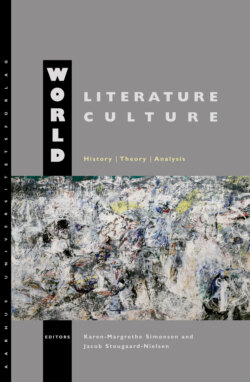Читать книгу World Literature, World Culture - Группа авторов - Страница 6
На сайте Литреса книга снята с продажи.
MIGRATION
ОглавлениеWorld literature is often defined as literature from around the world that also focuses and reflects on cultural differences. In recent years, however, attention has to some extent shifted away from the cultural embeddedness of literature and the arts towards the transcultural negotiations in which any work of literature or art is engaged. According to this line of thought, the literary work should be seen not only as expressing an extra-literary cultural identity, but as playing a transformative role through a variety of complex cultural interactions. The prevailing tendency, therefore, is to move away from explicating exotic cultural identity (whether monocultural or multicultural) in favour of examining the ways in which cultural identities are connected with the rest of the world. Migration is thus a key concept in understanding an important and unavoidable aspect of world literature and world culture: world literature is literature (and people) on the move. However, we need to reflect critically on the meaning of “world” in this context and especially on the relationships between world, aesthetics and identity. The “global” or “cosmopolitan” identities that have recently been the focus of discussion must be seen as distinct from both the socio-ethnical identity that postcolonial and cultural studies have focused on and the liberated individual identity that postmodernism tended to hypostasise. A new cosmopolitanism unites the local with the transnational and often the ethical perspective. In other words, there is no true cosmopolitanism without a grounding in local cultures, since these local cultures in themselves are what constitute the network of global circulation. This is what the concept of polycentrism means to Carlos Fuentes.
In the present negotiations between geography, culture and aesthetics, the old framework of the nation-state must be reconsidered. We have become accustomed to the constantly reiterated announcement of the death of the nation-state, but we should also acknowledge that nationality means different things to different people in different regions. For minority cultures, the nation-state may even be a place of shelter and a “positive burden” (see Dragana Obradović). The role of the city, too, needs to be reconsidered within this new paradigm. Historically, the city has been closely linked to modernity. Today, it also functions as a figure for the modern condition, not in the sense that it fosters the avant-garde of a specific culture, but in the sense that it reflects all the complexity of the globalised world. In the transnational urbanism of today’s capitals the local means just as much as the global. The local is both there, in the city, and thousands of miles away in the home country of the first, second, and third-generation emigrants who constitute the metropolises of the world (see Marie Lauritzen).
The island can seem the most isolated geographical places in the world. Yet some islands, for instance in the Caribbean, seem to function as a meeting-place for individuals from all over the globe, all of whom share hybrid cultural roots. This cultural and geographical meeting ground is at the centre of Derek Walcott’s epic poem Omeros. In the common space of the island there is a continuous negotiation of cultural and linguistic codes that at the same time reveals areas of untranslatability (see Eleonora Ravizza). Madeira and Cape Verde, both places of transit for migrant writers, can likewise be seen as cultural archipelagos: places in which different cultures meet and blend. World literature is an archive of migratory experiences, and may function as a kind of verbal refuge from the sense of exile (see Ana Salgueiro Rodrigues).
